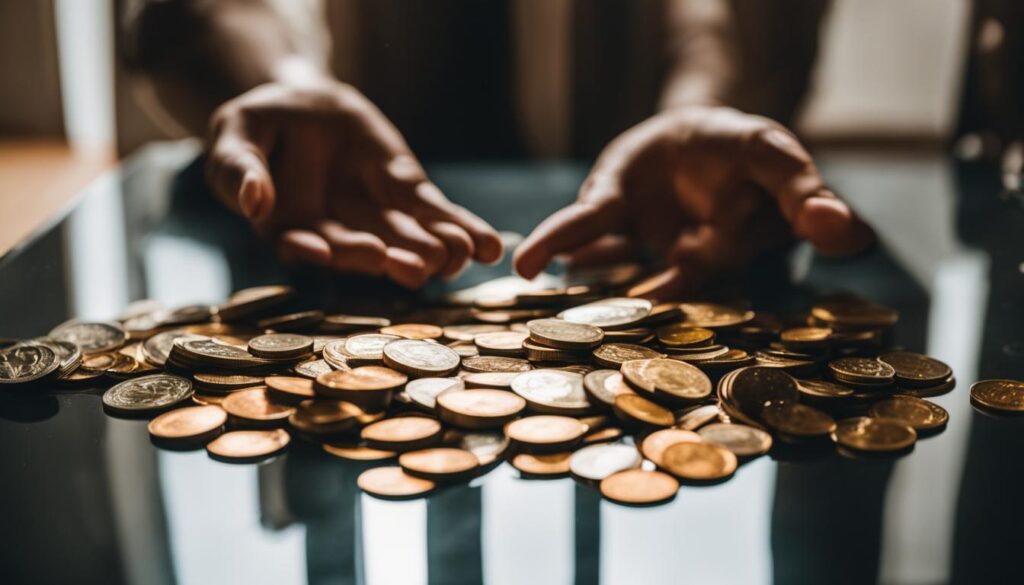Money guilt, financial shame, and guilt about spending are common emotions that many individuals experience when it comes to their relationship with money. These feelings of inadequacy, guilt, or embarrassment can have a profound impact on our financial decisions, overall well-being, and ability to achieve success.
Money shame can stem from various sources, including character shame, behavioral shame, and shame related to our perception of how the world works. Understanding the specific causes and examples of money shame is crucial in the process of healing and moving forward in a healthier financial mindset.
By examining our underlying money beliefs, we can begin to build a foundation of self-love and belief in oneself. It is essential to foster an environment where we feel comfortable talking about money without judgment, as well as making and receiving money with confidence. Creating a safety net, such as an emergency fund, can also provide a sense of security and contribute to healing money shame.
Key Takeaways:
- Money guilt and financial shame can impact our relationship with money and hinder our success.
- Understanding the causes and specific examples of money shame is key to healing it.
- Building self-love and belief in oneself is crucial in overcoming money guilt.
- Being comfortable talking about money and making and receiving money helps build healthier relationships with wealth.
- Creating a safety net, such as an emergency fund, can provide a sense of security and aid in healing money shame.
What Causes Money Shame?
Money shame is a deeply ingrained emotion that can have a significant impact on an individual’s life and their relationship with money. Understanding the causes of money shame is essential in healing and overcoming this debilitating feeling.
Money shame can stem from various factors that differ from person to person. These causes can include:
- Choices: Making financial decisions that one feels guilty about, such as overspending or accumulating debt.
- Identity: Feeling shame about not meeting societal expectations or comparing oneself to others regarding financial success.
- Family and society: The influence of upbringing, family beliefs, and societal messages about wealth and worthiness.
These causes of money shame can manifest in different ways, impacting an individual’s relationship with money. Some common impacts of money shame include:
- Difficulties in managing finances due to fear and guilt.
- Feeling undeserving of money and self-sabotaging when it comes to financial success.
- Fear of spending money and enjoying the fruits of one’s labor.
Recognizing specific examples of money shame is crucial in understanding and healing this shame. Individuals may experience shame about not earning as much as their peers, feeling guilty about receiving financial support, or feeling inadequate in the face of societal expectations.
By delving into the causes and impacts of money shame, individuals can gain a deeper understanding of their own relationship with money and take steps towards healing and building a healthier mindset around wealth.
| Causes of Money Shame | Impacts of Money Shame |
|---|---|
| Choices | Difficulties in managing finances |
| Identity | Feeling undeserving of money |
| Family and society | Fear of spending money |
Healing Money Shame
Healing money shame starts with understanding its roots and uncovering your money beliefs and personal money story. It’s crucial to recognize how family dynamics and childhood experiences have shaped your beliefs about money. By gaining this understanding, you can begin to challenge and reshape those beliefs, leading to a healthier relationship with money.
Building belief in oneself is a key aspect of healing money shame. Developing a strong foundation of self-love and self-compassion is essential. Embrace the idea that your worth is not solely determined by your financial status. Use your relationship with money as an opportunity for personal growth and self-improvement.
Another critical step in healing money shame is to feel comfortable talking about money. Open and honest conversations with partners, family, and friends can help break down barriers and foster healthier relationships with money. By normalizing discussions around financial matters, you can alleviate the shame and secrecy often associated with money.
Feeling at ease with making and receiving money is also crucial. Visualize yourself experiencing financial success and allow yourself to become comfortable with the idea of having and receiving money. Shift your mindset from scarcity to abundance and believe that you are worthy of wealth and financial prosperity.
Creating a safety net, such as an emergency fund, can provide a sense of security and help in healing money shame. Knowing that you have a financial cushion for unforeseen circumstances can alleviate anxiety and allow you to focus on building a healthier relationship with money.

Overall, healing money shame involves understanding and transforming your money beliefs, building belief in oneself, engaging in open conversations about money, embracing the ability to make and receive money, and creating a safety net. By taking these steps, you can break free from money shame and cultivate a healthier and more empowering relationship with wealth.
Feeling Guilty for Having Money When Others Don’t
One common form of money guilt is feeling guilty about having money when others don’t. This often leads to feelings of injustice and unfairness. It’s natural to question why we have been fortunate while others struggle, but dwelling in guilt does not serve anyone.
To overcome this guilt, it’s essential to shift from guilt to gratitude. Rather than feeling guilty, we can recognize and be grateful for our luck, skills, and privileges. Gratitude helps us appreciate what we have and acknowledge that it is not a reflection of our worthiness or others’ lack of it.
Expressing gratitude is just the first step. Another powerful way to alleviate guilt is by helping others. By giving back to those in need, we contribute to making a positive impact and creating opportunities for others. Helping others reminds us of the interconnectedness of humanity and allows us to use our resources to make a difference.
However, it’s important to understand that taking care of oneself is necessary before helping others. By acknowledging our own needs, honoring our opportunities, and working hard, we ensure that we are in a position to provide help and support. Recognizing that others may not have had the same chances does not diminish our accomplishments but rather empowers us to use our wealth to uplift others.
Overcoming guilt about having money when others don’t is an ongoing process. It requires a shift in mindset, from guilt to gratitude, and from guilt to action. Embracing gratitude and helping others allows us to transform guilt into a force for positive change, enabling us to use our resources to make a meaningful difference in the world.

How Can Letting Go of Money Guilt Improve Your Relationship with Money?
Letting go of money guilt is essential for confronting money shame and spending. By addressing and understanding our feelings towards money, we can improve our relationship with it. Eliminating guilt allows for healthier financial habits, leading to better money management and ultimately, a more positive connection with our finances.
Conclusion
Overcoming money guilt and building a healthier relationship with wealth is a journey that requires introspection and action. By understanding the causes and specific examples of money guilt, individuals can begin the process of healing and transformation.
Addressing one’s money beliefs is a crucial step in this journey. By examining and challenging deep-rooted beliefs about money, individuals can reframe their mindset and develop a more positive and empowering view of wealth.
It is also important to build belief in oneself and cultivate self-confidence. By recognizing one’s worth and inherent abilities, individuals can overcome self-doubt and develop a stronger sense of financial well-being.
Creating an open and comfortable space to talk about money is another essential aspect. By openly discussing money matters with loved ones, seeking advice, and sharing experiences, individuals can normalize conversations about wealth and develop healthier perspectives on financial matters.
Additionally, creating a safety net, such as an emergency fund, can provide a sense of security and peace of mind. This financial cushion allows individuals to navigate unexpected circumstances without feeling overwhelmed by guilt or stress.
Expressing gratitude and finding ways to help others can also play a significant role in overcoming money guilt. By appreciating the opportunities and blessings one has, individuals can shift their focus from guilt to gratitude. Giving back to the community and supporting causes that align with personal values can bring a sense of fulfillment and purpose, further contributing to a healthier relationship with wealth.
Building a healthier relationship with money requires continuous effort and self-reflection. By honoring one’s opportunities, embracing a positive mindset, and taking proactive steps, individuals can overcome money guilt and forge a path towards financial well-being and abundance.
FAQ
What is money shame?
Money shame is a feeling of guilt, inadequacy, or embarrassment due to having too much or too little money. It can impact your relationship with money and hinder your success.
What causes money shame?
Money shame can be caused by various factors, including choices, identity, and the influence of family and society. It can lead to difficulties in managing finances, feeling undeserving of money, and fear of spending.
How can I heal money shame?
Healing money shame begins with understanding its causes and specific examples. This includes uncovering money beliefs, building belief in oneself, and developing a strong foundation of self-love. It’s essential to be comfortable talking about money and making and receiving money. Creating a safety net, such as an emergency fund, can also help in healing money shame.
How can I overcome guilt about having money when others don’t?
Shifting from guilt to gratitude by recognizing and being grateful for one’s luck, skills, and privileges can help overcome this guilt. Expressing gratitude and giving back to others can alleviate guilt and make a positive impact. It’s important to honor one’s opportunities, work hard, and take risks while recognizing that others may not have the same chances.

